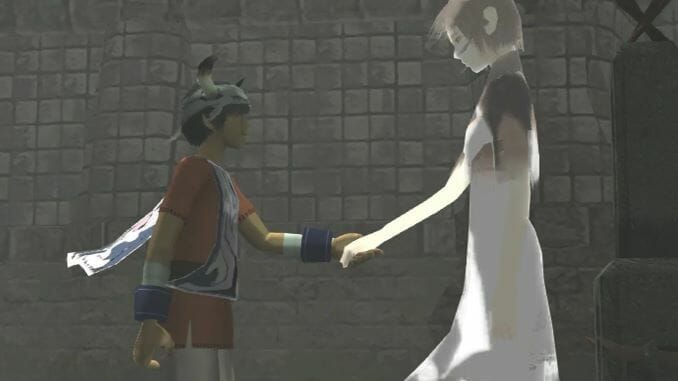Modern Franchise Games Owe Everything to Ico but Refuse to Learn From It

Booting up Ico in 2022 is at once surreal and familiar. Allegorical genre fiction about protecting an NPC companion are now diamonds in Sony’s crown jewels. God of War and both parts of The Last of Us are directly and indirectly pulling from Ico’s influence. Its austere structures live on in practically every From Software game of the past decade. To play Ico is to see the genesis of multiple ongoing trends throughout AAA videogames. After all this though, it’s mostly what the games Ico influenced leave behind that strike me.
In brief, Ico concerns its titular hero, a young boy with horns, and a slightly older woman named Yorda. Both are imprisoned inside a massive castle. Both rely on each other to escape. Ico protects Yorda from shadowy creatures who seek to return her to prison, while Yorda’s magic enables navigation throughout the castle. The game’s storytelling is sparse, mostly relying on scant gestures, to the point where much of the dialog in cutscenes is untranslated fantasy-speak. That bareness carves away all but the essential elements of caring for a computer person. In some sense, though its influences chain out into both past and future, Ico is ground zero for a certain kind of an NPC companion. It prompted countless designers into thinking about how to recreate that feeling.
The problem is, they largely get it wrong. The Last of Us, Bioshock, God of War, and even more explicit homages like 2006’s Prince of Persia fill up Ico’s deliberate space with empty words and far less meaningful gestures. For a game about a human relationship, Ico is quiet and lonely. The castle is massive and the camera zooms out far from Ico and Yorda’s tiny bodies. It’s that loneliness that makes preserving this fragile bond feel so vital. In contrast, Joel and Kratos dominate their game’s frames. In kind, there is little question that they will accomplish their conquering quests, no matter how morally ambiguous. Ico’s framing, at least, brings its heroes’ ability to escape into question. While a multitude of games pull from Ico’s narrative, far fewer dare to reduce their protagonists to specks. In fact, Ico’s influence often feels like a case of diminishing returns. Its idiosyncrasies and quirks doomed to be smoothed out in more popular, but far less artful, games.
Take, for example, the oft-cited hand holding. By pressing R1, Ico can call Yorda over. If she is close enough, he’ll take her hand. Because the pair share no language, this touch is Ico’s only means of talking to Yorda. In some sense, this is just the Son Action Button from God of War. It is, as Em explores at length in the previous link, a means of exerting control over a NPC. The button presents a set of player actions, rather than a genuine means of communicating with a character. In Ico, the button lets the title character pull Yorda along, facilitating her into the action of the game. In some instances, you use Yorda as a weight to solve a puzzle. It’s easy, and not unjustified, to extrapolate to “this makes Yorda into an object.”
I want to resist this reading, at least a little, because the details of how this works matter. Often, you’ll call Yorda because you need her to open a door. But just as often you’ll call her because Ico and her are trying to escape together, because thematically, more than practically, two hearts are better than one. Furthermore, unlike God of War’s boy, Yorda’s actions are not instantaneous. If Ico is far enough away from her, the camera twirls over to Yorda, watching her as she approaches. In short, she is a body in the world. Pressing the button doesn’t just summon her magically, she has to come to you. If she’s far enough, Yorda will not even hear you. That physicality continues in running with her. If Ico runs holding Yorda’s hand, she flails and stumbles. Because Ico and Yorda do not share a language, she does not know where he is going to go. Ico is a child, and his reckless movement while running reflects more an unbound enthusiasm than manipulation. Still, it’s clearly an uncomfortable experience for Yorda. Thus, in a magical, poetic little touch, the player can press circle to make Ico walk. There’s no practical reason for the walk button, but it’s gentler. It implies that Ico is taking the time to guide Yorda, rather than rush her (though when trying to escape magical monsters, a little rushing is inevitable.) It allows an expression of care, a moment of intimacy, that God of War or The Last of Us so rarely summon outside of cutscenes.